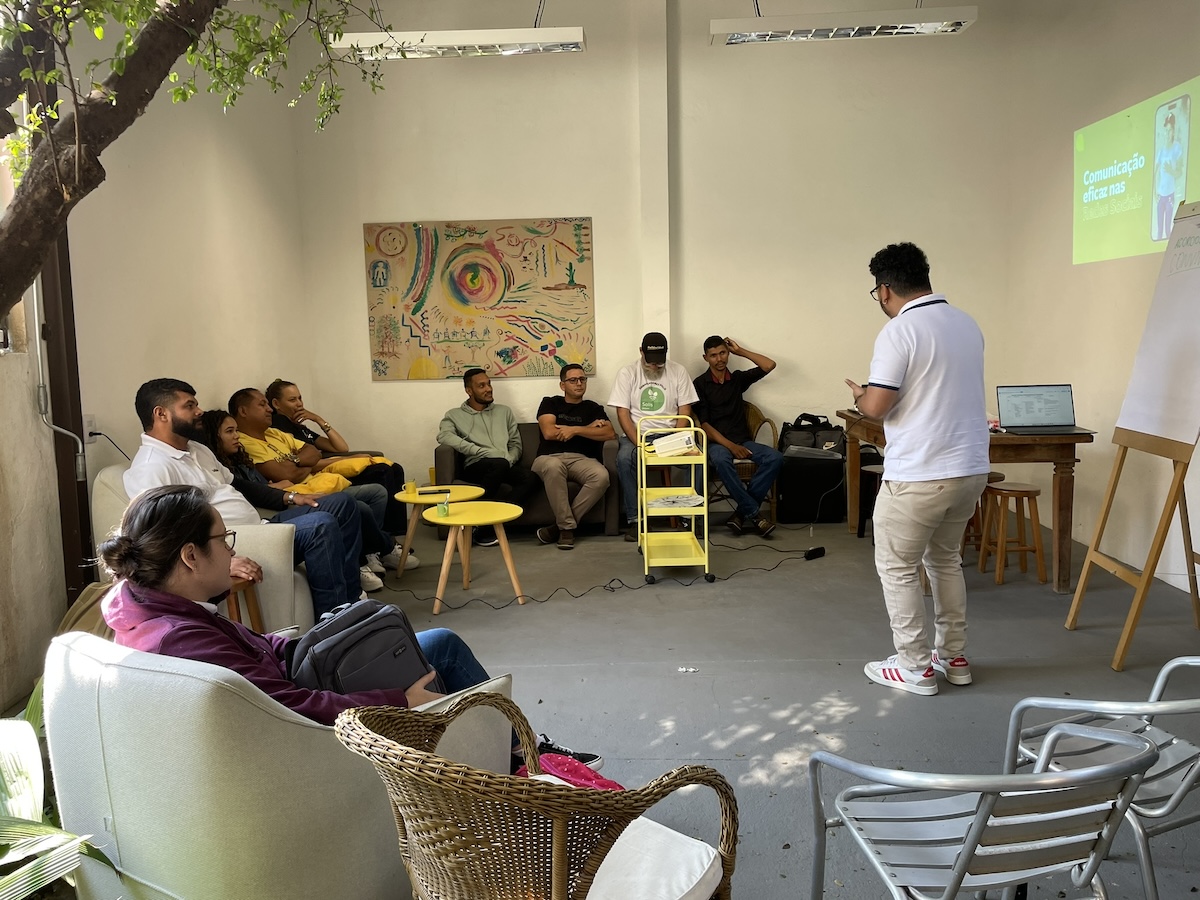Young farmers from cocoa-farming and livestock-raising families in Brazil are learning how communications can help spread the word on good farming practices. Photo: Solidaridad
Five young farmers recently joined Solidaridad in Brazil as ‘Agroecolgy Ambassadors’ to learn how they can encourage interest in agriculture and agroecology among young people. Alaion Costa Lacerda, 32, Edinael Dias, 24, Irivelton Tavares, 32, Kelly Santos, 23 and Marciana Souza, 20, are residents of Anapu, Pacajá and Novo Repartimento, three municipalities in the Brazilian region of Pará. Each of them is continuing their family legacy in cocoa farming or cattle ranching.
“Every day, more young people are becoming interested in studying and leaving the farm. Then you wonder: if this ends, what will happen to urban areas? Family succession is necessary. For cities to grow, we need to produce.”
Marciana Souza, a participant who is studying to eventually take over the family farm in Anapu.
Entitled “Ambassadors of Agroecological Transition”, these young farmers travelled to São Paulo to learn about social media content production and audiovisual communication with the Solidaridad Digital Solutions team. For three days, they participated in lectures and workshops on digital communication, storytelling, video recording and editing techniques, smartphone use, engagement strategies, post planning, and content management.
“Young people play a crucial role in agricultural succession and have the ability to constantly connect with others. Digital tools are very attractive to young people and enable the exchange of experiences among producers,” said Flavio Quental, one of the agroecology trainers who led the sessions.

Putting the training into practice
The five Ambassadors used their new knowledge to produce short videos for Solis, a mobile app developed by Solidaridad that connects farmers and field officers.

The content created by these young farmers was uploaded to the Solis platform, which also features a “Field Channel” where farmers can share informative videos about daily life on their farms. For example, they can share how they adopt best practices and translate technical concepts into their everyday work, contributing to an environment in which all farmers can benefit from local knowledge.
“Our region is sorely lacking in ideas and information. With Solis, we’ll be able to disseminate and post best practices in the field on the app.”
Alaion Costa Lacerda, a cocoa farmer and rancher from Novo Repartimento. He was also recently featured in this article on practices he is implementing on his family farm.
Before the workshop, the five ambassadors spent two days doing fieldwork across the three municipalities, where 78 farmers have adapted agroecological practices to local conditions. This helped them to get more familiar with agroecology, defined by their trainer Flavio Quental as a “combination of agricultural production with the conservation of natural resources.” Topics included organic fertilization, cocoa harvesting and fermentation, rotational grazing techniques, pest control, and the implementation of agroforestry systems.

“Family farmers use social media daily, whether for entertainment or as a source of information. And we’ve seen a strong focus on what directly impacts them. The goal of a workshop like this is to empower young people and encourage them to create narratives about their own lives.
Elias Serejo, a trainer for the ambassadors programme
They know better than anyone the challenges and benefits of farming, so once they’re able to use this language to build these narratives, they can engage more producers and spread this information.”
By combining agroecological practices with digital tools, these young farmers are ensuring that vital knowledge can be widely shared, strengthening traditional farming practices. The ambassadors’ work demonstrates how digital spaces can be crucial for connection and exchange among farmers. This way, individual knowledge becomes collective learning, ensuring that valuable practices not only endure, but also adapt for the next generation of family farmers.
ABOUT SOLIS
Solis is a development within the scope of the project Inclusive Digital Tools (ATDT), a partnership between Alliance of Bioversity International, CIAT and Solidaridad, funded by the European Union through its DeSIRA initiative, and managed by the International Fund for Agricultural Development (IFAD). The partnership began in February 2023 and ended in December 2024.

